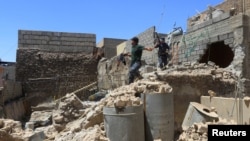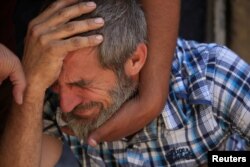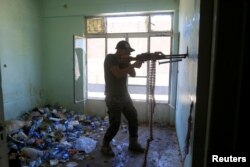The fight for Iraq's second-largest city is in its final push, with Islamic State down to fewer than 1,000 fighters in three neighborhoods of west Mosul, U.S. military officials said Friday.
Speaking with VOA via Skype from Baghdad, Brigadier General Rick Uribe, the deputy commanding general for U.S.-led coalition forces in Iraq, said the "level of desperation" from IS fighters was rising.
"They know they're about to lose," Uribe said, "so their goal is to inflict as many casualties, not only in the Iraqi security forces but on any innocent victims and anybody that's left."
Uribe told VOA many of the remaining IS militants were the "toughest fighters left" and had used their time in the city to build weapons caches, booby traps and tunnel systems.
According to Uribe, the fighters continue to take hostages in their attempts to bait the coalition into striking civilians. They also are destroying as much infrastructure as possible, he said, to make it more difficult to get the western part of the city up and running once they've been defeated there.
Car bombs
Coalition spokesman Colonel Ryan Dillon told reporters Thursday that the "weapon of choice in Mosul" continued to be vehicle-borne bombs.
"With the car bomb threat in mind, the government of Iraq directed civilians not to use cars or motorcycles to avoid being mistaken for militants," Dillon told Pentagon reporters during a phone call from Baghdad.
After initially asking civilians to shelter in place ahead of the Mosul battle, the Iraqi security forces have now called on all citizens to evacuate Old Mosul in order to reduce unintended casualties.
But fleeing can be a deadly decision for the 80,000 to 150,000 citizens trapped in the three remaining IS-controlled neighborhoods. Dillon said IS fighters were shooting some civilians as they fled, and that other citizens had died after accidentally stepping on explosive devices while trying to leave the area.
Dillon said about 4,000 Mosul citizens had fled each day recently, but that the number had drastically declined in the last 48 hours.
U.S. Central Command, which overseas American military operations in the Middle East, said in a news release Friday that coalition strikes had resulted in 132 additional unintentional civilian deaths, raising the total number of civilians killed by coalition strikes between August 2014 and May 2017 to at least 484.
March airstrike
Last week, a U.S. military investigation into a deadly March airstrike found that a secondary explosion had caused the deaths of more than 100 civilians in Mosul.
The investigation determined that IS fighters had placed large amounts of explosives in a building that housed civilians and then began attacking Iraqi forces from that building.
When the coalition targeted snipers on the roof, the explosives detonated, killing at least 101 civilians sheltering in the bottom floors and four civilians in a neighboring structure.
"There is no military force in the world that has proven more sensitive to civilian casualties," U.S. Secretary of Defense Jim Mattis said shortly after the strike. "We go out of our way to always do everything humanly possible to reduce the loss of life or injury among innocent people. The same cannot be said for our adversaries."






